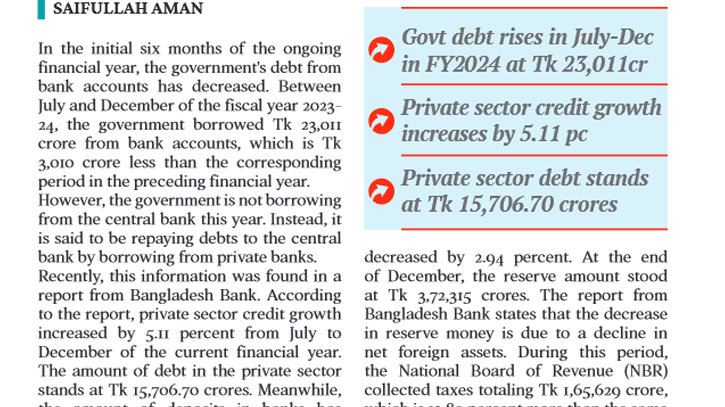
Photo : Messenger
In the initial six months of the ongoing financial year, the government's debt from bank accounts has decreased. Between July and December of the fiscal year 2023-24, the government borrowed Tk 23,011 crore from bank accounts, which is Tk 3,010 crore less than the corresponding period in the preceding financial year.
However, the government is not borrowing from the central bank this year. Instead, it is said to be repaying debts to the central bank by borrowing from private banks.
Recently, this information was found in a report from Bangladesh Bank. According to the report, private sector credit growth increased by 5.11 percent from July to December of the current financial year. The amount of debt in the private sector stands at Tk 15,706.70 crores. Meanwhile, the amount of deposits in banks has increased. Deposits increased by 3.70 percent in the six months, reaching Tk 16,542.87 crores.
Additionally, during the discussed period, the amount of reserve money in banks decreased by 2.94 percent. At the end of December, the reserve amount stood at Tk 3,72,315 crores. The report from Bangladesh Bank states that the decrease in reserve money is due to a decline in net foreign assets. During this period, the National Board of Revenue (NBR) collected taxes totaling Tk 1,65,629 crore, which is 13.89 percent more than the same period in the previous year.
In this regard, a top official from Bangladesh Bank told The Daily Messenger, “The central bank has reduced money supply in the market to control inflation. The government is not injecting new money into the market to control inflation. Additionally, money is being withdrawn from the market through the sale of dollars. Savings are encouraged, and borrowing is discouraged by raising interest rates.”
He further said, “Government expenditure has increased by about 23 percent compared to the previous year. However, on the contrary, revenue collection has not increased. This is because the cost of repaying foreign loans has increased due to the appreciation of the dollar. In this situation, the government is implementing monetary contraction to maintain overall economic stability. Borrowing from local sources has also decreased. Due to the shortage of funds, Tk 25,000 crore worth of bonds are being issued to various banks against the Tk 42,000 crore owed by the fertilizer and power-fuel sectors to the government.
According to Bangladesh Bank data, the government repaid Tk 29,498 crore to the central bank by December 28 of the current financial year. During this time, the government borrowed Tk 29,378 crore from commercial banks. Thus, the government is repaying the central bank by borrowing from private banks. Consequently, the net debt of the government in the banking system decreased by Tk 3,010 crore. However, the government has set a target of Tk 1,32,395 crore in loans from banks for the current financial year. Last financial year, the government borrowed Tk 1,22,980 crores from the banking system.
Meanwhile, the central bank sold eight billion dollars to various banks in the first seven months of the current fiscal year. In response, Tk 88,000 crore has been withdrawn from the market. Since August 2021, over Tk 280,000 crore has been withdrawn from the market by selling $29.20 billion.
As a result of this currency contraction, the money supply in the market decreases, and interest rates rise rapidly. In January, the highest yield on Treasury bonds rose to 12.17 percent. This upper limit was set by adding a margin of 3.75 percent to the six-month average interest rate on the 182-day Treasury bill, increasing the interest rate ceiling from 9 percent since last July. As a result, the interest rate has increased to 12.43 percent in February.
Messenger/Fameema








